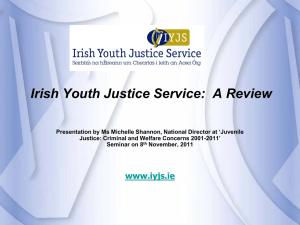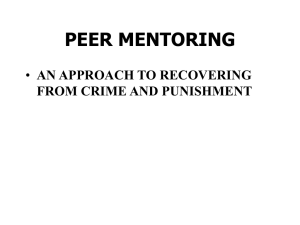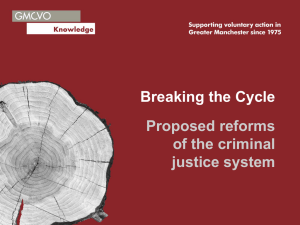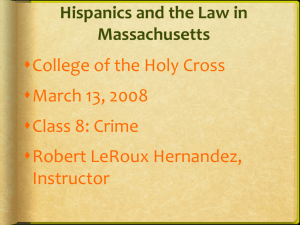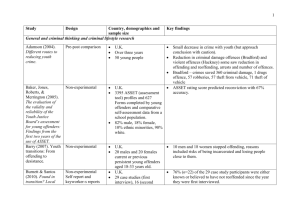Speech by the Hon NN Mapisa-Nqakula, on the occasion of the
advertisement
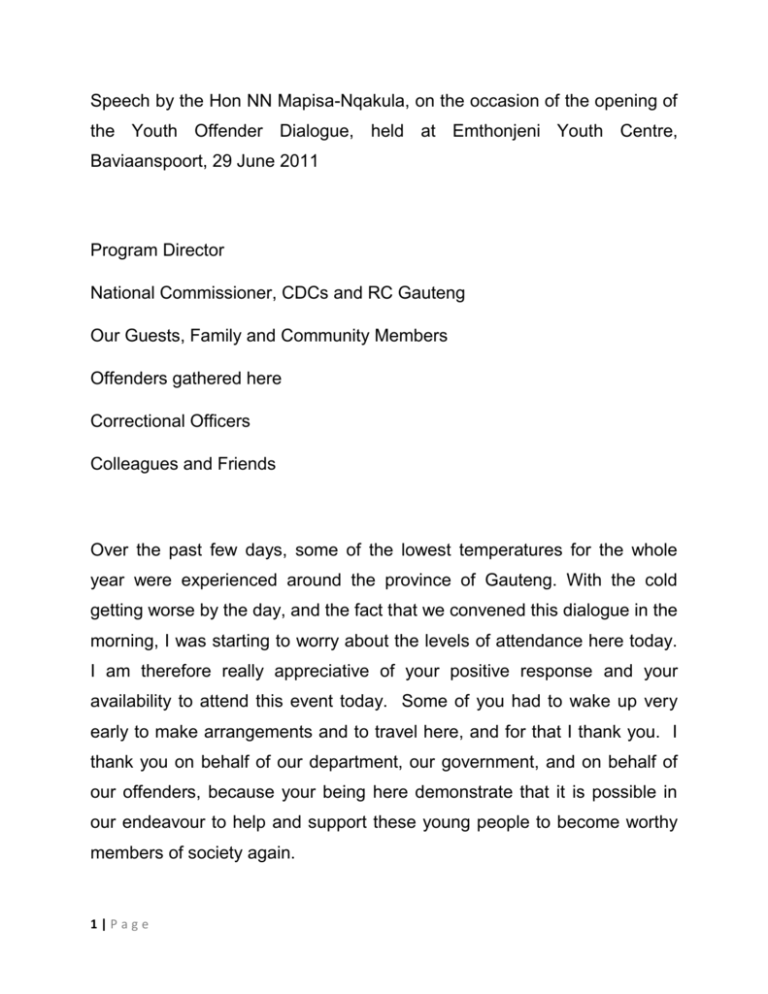
Speech by the Hon NN Mapisa-Nqakula, on the occasion of the opening of the Youth Offender Dialogue, held at Emthonjeni Youth Centre, Baviaanspoort, 29 June 2011 Program Director National Commissioner, CDCs and RC Gauteng Our Guests, Family and Community Members Offenders gathered here Correctional Officers Colleagues and Friends Over the past few days, some of the lowest temperatures for the whole year were experienced around the province of Gauteng. With the cold getting worse by the day, and the fact that we convened this dialogue in the morning, I was starting to worry about the levels of attendance here today. I am therefore really appreciative of your positive response and your availability to attend this event today. Some of you had to wake up very early to make arrangements and to travel here, and for that I thank you. I thank you on behalf of our department, our government, and on behalf of our offenders, because your being here demonstrate that it is possible in our endeavour to help and support these young people to become worthy members of society again. 1|Page Our biggest fear as a department is not that we may not be up to the task of making rehabilitation possible. No. Our biggest fear is that without the involvement of communities, without the support of families, what we are doing here with the offenders will be reversed. That if we do not succeed in getting the communities and the families, we all shall fail. We are convinced that if the hard work of these officials, and the determination of these offenders, should pay off, we need to have an engagement with the families and the communities to lend their support for the change that needs to continue in each one of these offenders once they have been reintegrated into society. We have invited you to this dialogue, so that we can engage each other, so that your children can hear how you feel and how you affected by their being here. In turn, so that you may hear what is it that they need to communicate with you about their feelings and experiences of what they have done. From the onset, I want to emphasise our belief that talking changes people. It changes their circumstances, and it clarifies certain things that if left unsaid, may result in some of the situations we have with these young offenders today. In fact there are many of them here, and I am not saying all of them, who will tell you how things would have been different if someone talked to them or when they talked, if someone listened. The system of corrections is about meaningful change that allows for second chances, and even in the case of lost opportunities for talking, we work on the basis that it is never too late. 2|Page So once more allow me to welcome you all and ask that you feel comfortable as we embark on this journey together. Program Director, The reading of the newspaper headlines relating to crime yesterday painted the kind of picture that prompted me to want to premise my input to you today on such reports. Thinking about this event that we are having here today, three my attention was drawn to three specific reports that further demonstrated for me why we need to have a dialogue as a nation about the impact of crime in our society, in our communities and most importantly, within our families. The three reports were within a page or so of each other in the main section, as part of the leading stories of the local newspapers. The first and by far the most disturbing story had to do with the arrest of an eight year old boy in connection with the murder and rape of a 3 year old girl in Cape Town. Understandably, this is a case on which more information could not be provided due to the age of the minors involved. But what is worrying for me, and for purposes of this discussion is the fact that young children as young as eight years old should even be associated with a gruesome crime of rape and murder and this is a matter I will like us to come to later. In the second report, during the release of the report of the UN Office on Drugs and Crime yesterday, a side report by SA Central Drug Agency, released alarming statistics of the growth in the abuse of illicit substances such as drugs and alcohol and the relationship between this and the commission of violent crimes. 3|Page The prevalence of this abuse amongst young people should become the biggest concern for government, social workers, schools and families alike. Lastly, there was a report that I also thought requires mention here at this morning, regarding the sentencing of two men accused of raping one of officials on the grounds of this very centre at which we congregate today. While we welcome the punishment of these perpetrators of a cowardly crime, we remain concerned that those who have dedicated their time and their lives in the service of protecting our people are themselves being violated as victims of crime. Even more disturbing, and this is something we this dialogue should discuss, is the fact that these perpetrators are only 21 and 26 years of age respectively. Now colleagues, parents and friends, I have decided to share these stories, some of which many of you might have read, so that as we open this dialogue, it should not just be about a talkshop. It should be about us recognising that the problem of crime committed by our children, which is the reason why we are all here, is real, and that it affects real people and changes people’s lives forever. Not only does the commission of crime change the life of a victim, but that of the person who commits crime too. In the main, that is the reason why we thought we should all meet here to START having a meaningful dialogue, as offenders, as families - as friends. Young offenders between the age of 18 and 35, constitute around 70% of our total inmate population in the country. young people. 4|Page We are a prison system of Hundreds of thousands of South Africa’s potential future leaders and contributors are languishing in correctional facilities, some of them having committed very serious crimes as you have seen in reports to which I referred. They were not born as criminals, and just as society did something that created a culture of offending behaviour amongst them, so must we do something to correct offending behaviour, as a society. Crime is not just a South African phenomenon and dynamic. It is borne of social behaviour and needs to be addresses as such. Now and then, every society asks itself why some of its own members break its rules and ethics, we ask ourselves why some individuals amongst us commit crime? The answer to that question is closely linked to our understanding of how children become involved in delinquent behaviour and develop this behaviour with them as they grow up into more defined acts of crime. Our understanding of the involvement of young people in crime, therefore forms the basis on which we should understand how human beings turn to offending behaviour. Our preoccupation with young offenders, and the role played by the circumstance of their social upbringing in their offending behaviour, should therefore be understandable. Easily put, in order to unravel the underlying causes of offending behaviour and criminality, most often than not the answers need are in the childhood stages of an offender. This ladies and gentlemen is the reason why we are here. 5|Page I hope you do not think that we invited you here to blame parents for hoe their children turned out. That will not be correct. Children are not only brought up by their parents and their families. Society plays an important role in what kind of adults our children are going to be. There social structures, there are schools, friends, role models, economic circumstances, wars and conflict, values and perceptions. All these combine to shape young people into the adults they will become. The issue is not so much whether to put the blame on parents or on society, but to recognise that both parents, families and society have different and specific roles to play in shaping the foundations on which our young people will base their choices. Young people too, have their own and specific roles in relation to these choices. It is a balance we can get right. My biggest concern is for those children, who are not in the communities out there, but who effectively are being brought up by the prison system. Those children, for whom the only parent, home and community they have ever been exposed to, is a correctional centre. Children exclusively being raised up by the system until they are in their old ages. Some of these children are here today, and they yearn for the support of their families. For some of these children, they have not even had a single visit from anybody since they came here, let alone a family member. This centre where are at has a total of .. inmates, amongst them a total of 517 of them had not had a visit in the last six months or more. 6|Page This does not bode well for their rehabilitation as they start to believe that they are not worthy to anyone, they are on their own, and depend on themselves to forge their own way forward. They do not have the motivation or incentive that if I change I will make my mother or my brother or younger sister or son, a happy person. A motivation they all need. The message we want to send to parents in particular is that there is no dustbin for human beings. We all need to break the cycle of crime. We are teaching these young people to take responsibility for their crimes, to recognise that they have affected certain people, including their families. We are working with them to let them know that if there is to be change, it has to start with them. But they need support. We are already working with other government departments to create a support structure and assist young people, including those who have not yet committed crimes to make alternative choices, better choices that going into a life of crime. We believe that education and amenities for recreation, allow children to realise their true potential, skills and talents. For many that did not have access to these services who ended up in our centres, we are pursuing initiatives for them to access them. It is for this reason that we have declared that education for all our juveniles will be compulsory in our centres and that this will be an important consideration in determining suitability for parole. We are also working with NGOs and sister departments to establish Halfway Houses for those inmates who either do not have family support structures or those can’t cope with the outside world. We believe that 7|Page young people who were living in the streets or are yet to establish family connections can benefit from these halfway houses without plunging into a non-supportive environment that ultimately turns them back into a life of crime. Young people who were homeless at the time of their incarcerations who are without traceable addresses, including those from informal settlements, will now benefit from the system of parole as we will be introducing the electronic monitoring system for parolees. This system will make us know and account for all our parolees and their activities. We intend to implement this as an urgent intervention before the end of the year. We are inviting to be part of these initiatives and to assist young people when they are released to continue on the path of full rehabilitation. Before I sit, let me share with you the words of a mother who finaly found the strength of going to visit her son in prison for the first time after all she conquered her fears and all the blame she gave herself. It is the account that she herself wrote on one of the social networks which is a support group for parents, and we share it here with you with the hope that it will set the tone for our dialogue: She says: “Hello,everyone, Just wanted to let you know that I had my first visit with my son yesterday. I was a nervous wreck but after I got in and got to see him and to actually give him a hug and a kiss all of my worries were put on hold for the time 8|Page that I was there. It was quite the experience but I survived and I held myself together during the visit but man oh man when I got in the truck I cried a river of tears. It was a very long day, I had to get up a 5:00 a.m. and then when I got back at 3:00 I had to go to work for four hours. So needless to say I went to bed very early last night but it was the first good night of sleep that I have had in a Well, long just wanted Susan I thank you all 9|Page to update everyone time. talk to ya all later.
